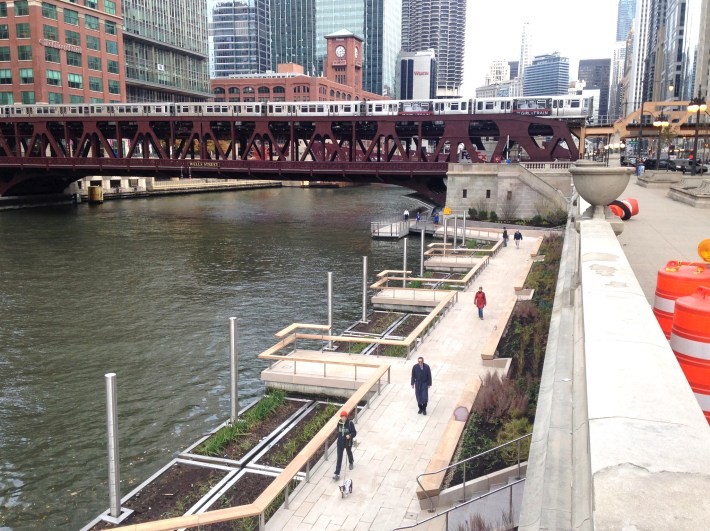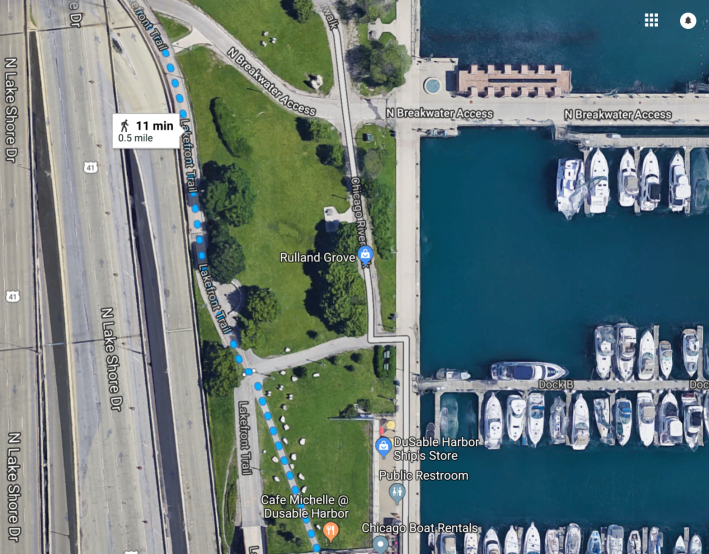Update 10/4/18: While Anita Balodis indicated in her Sun-Times interview and in a phone message she left me yesterday that her bike/ped crash occurred on the Lakefront Trail's crossing of the Chicago River, when we spoke on the phone this morning she revealed that it actually happened a bit further south of the bridge. The post has been edited accordingly. -JG
Last month 42nd Ward alderman Brendan Reilly introduced an ordinance to completely prohibit cycling on the Chicago Riverwalk. As I've pointed out previously, this proposal is misguided because the riverwalk was originally conceived and pitched to the federal government as a bike facility and appears as an off-street trail on the city’s bike map. The Active Transportation Alliance has also voiced opposition.
Don't get me wrong; there's no question that conflicts between pedestrians and cyclists sometimes occur on the promenade. And, as is the case anywhere else in Chicago where it's legal to ride to bike and walk, including city streets, the Lakefront Trail, and The 606, and other shared-use paths, people who cycle on the riverwalk in a manner that endangers pedestrians are being reckless and deserve to be ticketed.
At some times of year, at some times of day, in some locations on the riverwalk with busy bars and cafes, it truly isn't safe, practical, or courteous to ride a bike much faster than walking speed. I'd prefer that we let common sense prevail, but I wouldn't have a major problem with prohibiting cycling during the warmer months on the retail-dense sections of the path between State and Franklin during, say, post-work happy hours and prime time on weekends. That would leave the route open for bike commuting and recreational riding at other times.

But what Reilly is proposing is a 24/7, 365-days-a-year ban, on all sections of the riverwalk, based on the notion that people on bikes are posing a serious threat to people on foot and folks with disabilities. "We can’t have pedestrians and people with strollers or in wheelchairs being forced off a pedestrian path that close to the water,” Reilly said when he first floated the proposal.
Again, conflicts between cyclists and pedestrians are no joke, and there have been rare incidents of bike/ped crashes in Chicago that have resulted in serious injuries (although there are no documented cases of such collisions resulting in a fatality in our city.)
But it's worth noting that between September 15, 2017 and September 15, 2018, there were 296 CPD-reported cases of drivers striking pedestrians in the 42nd Ward, according to Illinois Department of Transportation data. Of those collisions, 211 resulted in an evident injury, and 48 of the crashes led to an "incapacitating injuring," one that the victim couldn't walk away from. Meanwhile, in my daily review of local news articles about traffic crashes, I've seen no reports of incapacitating downtown bike/ped collisions during that period.
So while conflicts between pedestrians and cyclists are a non-trivial issue, it's clear that motorists represent the most pressing danger to pedestrians downtown. As such, Reilly should be focusing on that exponentially more serious safety threat to people on foot, rather than spending his time trying to ban cyclists from bikeways.
In fairness, just because no incapacitating bike/ped crashes were reported in the media, that doesn't mean there were no bike/ped collisions at all. For example, in an article on Reilly's proposal, the Sun-Times reported that Streeterville resident Anita Balodis "was walking along the Riverwalk [emphasis added] near her condo on Memorial Day when she was hit by a cyclist."
In reality, the crash didn't take place on the riverwalk. "I live in Lake Point Tower," Balodis said in a video embedded in the Sun-Times post. The condo tower is located next to the Lakefront Trail, about a block north of the Chicago River. "Last Memorial Day I was walking south across the river and as I turned I got hit by a bike." That indicated that the collision actually occurred on the Lakefront Trail.
Reached by phone, Balodis clarified that the crash happened on the shoreline path a couple hundred feet south of the river. "I love to walk by the lake," she said, adding that she was making her way south to the Museum Campus at the time. After crossing the river, she was walking on the far-right side of the trail when she looked behind her to check for bike traffic before crossing left to get to another path leading southeast to Cafe Michelle and the waterfront. But after she started making the crossing, a middle-aged female cyclist rolling downhill from the river bridge struck her. A blind turn in the path just north of this junction may have played a role in the crash.

Balodis said she was knocked down, and other woman fell off her bike. The pedestrian fell on her left side and scraped up her lower arm and bruised her hip, but she said that, as a retired doctor, she realized she hadn't broken anything. She added that the cyclist stayed on the scene and was apologetic, and several bystanders came by to help, but she wasn't interested in going to the hospital or filing a police report. "I was able to walk, so I just wanted to go home and put ice on it."
Once again, when crashes like the one Balodis experienced take place, it's no laughing matter. (For the record, she's in favor of the riverwalk bike ban.) The current project to separate bike and pedestrian traffic on the entire Lakefront Trail is helping to reduce such conflicts. (It may not have helped in this case, since no changes are planned at that location, and the long-delayed Navy Pier Flyover won't go that far south.)
But no one is calling for banning cycling from the Lakefront Trail just because crashes sometimes occur. Likewise, it doesn't make sense to completely prohibit bike riding on the new sections of the Chicago Riverwalk, where there's no indication that there has ever been a serious bike/ped collision.
![]()
Did you appreciate this post? Consider making a donation through our PublicGood site.




